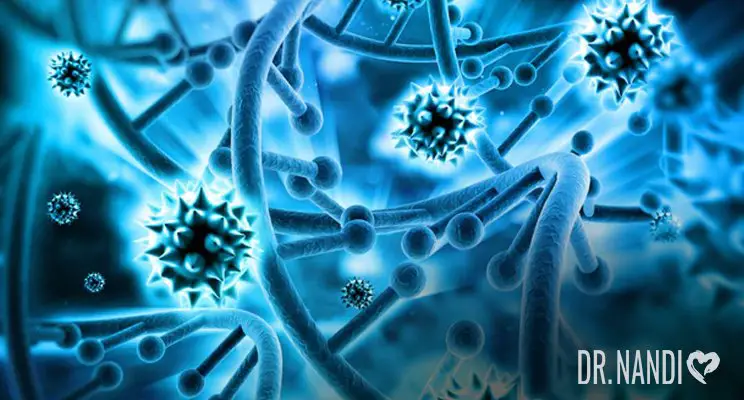Heading to the Doctor? Here is a Doctor Checklist for the Flu.
Flu got you down? You’ve come to the right place. In this post I will give you my top recommendations for recovery, as well as tips to prevent yourself from getting the flu or a cold in the future!
Getting the flu can really knock you flat. For some people it is not that severe, but for others it can result in hospitalization. Even if you only have a mild case of the flu, it is enough to keep you home from work and hurt productivity.
If you are feeling miserable and wondering what to do, check out the natural and conventional methods for beating the flu below.
What Is The Flu (Influenza)?
Influenza, most often simply know as “the flu”, is a respiratory illness caused by the influenza A, B or C viruses. It is extremely contagious, which is why it seems to spread like wildfire during “flu season” which commonly occurs in winter and early spring.
A flu virus makes its home in your upper or lower respiratory tract but can cause symptoms throughout your whole body, including:
- Sore throat
- Sneezing
- Headache
- High fever
- Body aches
- Extreme fatigue
An estimated 20% of the entire U.S. population gets the flu every year. So let us dive in and see what types of natural and conventional remedies can help you beat the Flu.
Natural Home Remedies
- Garlic- effective against both viruses and bacterial infections, garlic should be one of the first remedies you reach for. There are a few ways you can take it: chop a clove into a few small pieces, and swallow (like pills) with a glass of water or milk. You can also mince garlic and rub over toast with some honey. Add extra garlic to your meals. IF PREGNANT take only one clove per day. (1)
- Ginger- may help with fever, nausea and vomiting that sometimes accompanies the flu. Steam in boiling water to make a tea, or take in capsule form as directed. (4,5)
- Coconut Oil- may help boost the immune system by dissolving the lipid coating around viruses, making them easier to kill by the body’s defense mechanisms. (6)
- Oregano Oil- a potent natural antibiotic and antiviral. Diffuse around the home during illness. I do not recommend taking this oil internally. (2,3)
- Thyme- a natural antibacterial, you can drink thyme tea or diffuse thyme oil in the home during illness. (7)
- Cinnamon- a natural antiviral and antibacterial, you can mix 1 tbsp cinnamon, 1 tsp honey and 1 cup hot water and drink as a tea. This will help relieve congestion and may help with fever. (8,9,10)
- Elderberry – supports the body’s immune system and may help to relieve illness more quickly. (11)
Vitamins and Supplements For Flu Treatment
- Vitamin D3- an essential hormone precursor and immune-system booster. Some studies have found high doses of vitamin D3 (10,000 iu 3 times daily for 2-3 days) to help resolve symptoms of influenza completely. (12)
- Vitamin C- studies have found that taking 1000 mg 3 times daily helps to relieve and/or prevent symptoms of respiratory infections. (13)
- Zinc- deficiency of this nutrient has been linked to increased risk of infection and decreased immunity. Treatment with zinc is effective for a variety of infections and reduces risk of pneumonia. (14)
- Turmeric- curcumin, the active ingredient of turmeric has potent antibacterial, antiviral and antifungal properties. Studies have found it to have significant potential in inhibiting influenza viruses. (15)
Other Effective Natural Methods For Treating The Flu
- Face steam- boil water over the stove and remove from heat, cover your head with a towel and inhale the steam. This will help to break up congestion and relieve symptoms.
- Extra sleep- stay home (the flu is extremely contagious, anyway), rest as much as possible and avoid stress.
- Remove white foods- at the first sign of illness, stop eating grains, sugar and dairy.
- Hydrate- getting plenty of water will help to flush your system and speed recovery.
- Hot liquids- drink plenty of hot liquids to break up mucus and boost the immune system. Lemon, peppermint, nettle leaf, chamomile, yarrow and ginger tea are all great choices.
Conventional Treatments
Because the flu is a virus, it is not treatable with antibiotics. Most viruses need to run their course and conventional treatments are simply to help you feel more comfortable. There are a few antivirals that may be prescribed in severe cases but they come with some side effects.
Non-Prescription
- Pain Killers- ibuprofen, aspirin and Tylenol can help ease painful symptoms of the flu.
- Cough Syrup- if your cough is keeping you awake, use cough syrup so that you can get quality sleep.
- Decongestants- these can be helpful if you get extremely congested.
- Multi-symptoms medications- medications like NyQuil and DayQuil contain a blend of painkillers, cough syrup and decongestants so that you can tackle all of your symptoms with one medication. This can help to avoid overdose of any particular drug.
Prescription
- Oseltamivir (Tamiflu)- may shorten recovery time by 1-2 days, and eases symptoms such as congestion, cough, sore throat, fever and aches. It may also be used as a preventative method and works by stopping flu virus from growing. Potential side effects: nausea, vomiting, mood changes.
- Zanamivir- an inhaled drug which decreases the spread of influenza A and B among cells in the body. May also be used as a preventative method. Shortens recovery time 1 day on average if started within 48 hours of the flu symptoms beginning. Potential side effects: headaches, diarrhea, nausea, cough, vomiting, dizziness, flu-like symptoms. Should not be used by those who have asthma or other breathing disorders.
Flu Prevention Methods
Flu Vaccine
I recommend that everyone but a select few receive the flu vaccine annually.
Those with high risk of life-threatening complications from influenza should be sure to get the shot as early in flu season as possible. This includes:
- Pregnant women
- Children 6 months to 5 years
- Seniors 50+ years old
- People with chronic conditions who may be more at risk if they get influenza
- People who live with or take care of those in the above categories
It takes about 2 weeks for protection to develop after receiving the flu shot.
Regardless of whether or not you are in one of these categories, you should still make the flu shot a priority. The flu shot will help keep you from getting the flu or make it less severe if you do catch it. Getting the vaccine also helps to ensure you do not pass the virus to your family and other people. (15)
What Is The Flu Shot?
The flu shot is made with 3-4 different strains of an inactivated flu virus. There are three different approved manufacturing methods; egg-based flu vaccine, cell-based flu vaccine and recombinant flu vaccine. You can read more about each method on the CDC website here.
Because the flu virus in the chot is inactivated, it cannot cause the flu.
Flu viruses are changing every year and researchers can only take their best guess as to which ones will cause illness. Thus, the flu vaccine is not always 100% effective. It cannot prevent a virus that comes from strains not included in the vaccine, and it will not protect you from colds or other bacterial infections.
Who Should NOT Get The Flu Shot
There are only small groups of people recommended by the CDC to NOT to get the flu vaccine:
- Those with severe allergies to the flu vaccine
- Anyone who’s had Guillian-Barre Syndrome
- If you are already sick and thus have a weakened immune system
Risks Associated With The Flu Vaccine
There may be some minor discomfort after receiving the flu shot. Not everyone experiences these side effects.
- Sore arm
- Hoarseness
- Itchy, red eyes
- minor flu-like symptoms (small fever, cough, fatigue)
- Headache
If you have a serious reaction after a vaccine, visit your doctor or call 911. You can also report vaccine injuries to the Vaccine Adverse Reporting System (VAERS) by calling 1-800-822-7967 or visiting their website.
Other Methods For Flu/Illness Prevention
- Frequent hand washing
- Avoid close contact with sick people
- Avoid touching eyes and mouth before washing hands
- Disinfect surfaces that may have come in contact with flu virus
- Eat a nutrient-dense, balanced diet
- Reduce sugar intake to 6 teaspoons daily
- Get enough vitamin D
- Exercise
- Quality sleep
- Reduce stress
Heading to the Doctor? Here is a Doctor Checklist for the Flu.
Frequently Asked Questions About The Flu
Q. Can the flu kill me?
A. Although the flu virus itself is not usually the ultimately cause of flu-related deaths, there are people whose immune systems have a serious overreaction to the virus, causing internal damage, oxygen deprivation, hypoxia and death. (16) In most deaths related to the flu, the person dies from complications of the flu such as secondary bacterial infections or organ failure.
Q. Can flu cause depression?
A. Some scientists have found that symptoms of sickness mirror symptoms of depression. Those with depression tend to have higher inflammation levels than those without depression, making them more susceptible to illness. (17)
Q. Can the flu delay my period?
A. Your body is very intelligent. If you become ill, your body will act as if you are not well enough to get pregnant and may delay your cycle until you become healthy again.
Q. Can flu cause sepsis?
A. Someone with the flu may develop sepsis. Sepsis can be a result of any infection in the body. It is a deadly condition and one that should be treated immediately. Signs of sepsis include fever and chills, low body temperature, decreased urination, rapid pulse and breathing, nausea and diarrhea.
Q. Will the flu increase blood pressure?
A. Any infection in the body can affect your heart by causing increased blood pressure and heart rate. Your body is working hard to fight the virus the reason for increased strain on your cardiovascular system.
Q. Which flu do I have?
A. Most major flu pandemics are caused by influenza A viruses, although there will occasionally be outbreaks of type B. There is not much difference between influenza A and B other than how quickly they mutate. Both types of viruses are included in the yearly flu vaccine.
Q. What flu is worse, A or B?
A. Type A influenza tends to be more severe than type B, though people may have bad reactions to both.
Q. Why is flu worst in winter?
A. It is not entirely clear why the flu virus seems to thrive in winter months. Some speculate it is because people spend more time indoors and close to other people, thus making it easier for the virus to spread. Some people also tend to experienced weakened immunity during the winter months which makes them more susceptible to infection.
Q. How dos the flu spread?
A. The flu is an extremely contagious virus that spread through droplets from one’s nasal or oral cavity (i.e. sneezing, coughing, talking, sharing drinks, etc).
Q. How is the flu different from a cold?
A. A cold may carry similar symptoms to the flu, but they will not be as severe. It is uncommon for a cold to be accompanied by a high fever. Cold symptoms generally come on slowly over a few days, while flu symptoms tend to come on abruptly.
Conclusion
If you think you might have the flu, connect with your medical professional to see what they advise. Here is a Doctor Checklist for the Flu. It is becoming more common for medical offices to offer virtual visits so that you seek counsel from your physician without leaving your home.
I believe strongly that we all should be our own #HealthHero. This means that you are committed to your own well being and will do what it takes to live a life of health and vitality. When you feel your best, you can make the most impact in the lives of those you love and in the community.
Did you find the information in the post useful? What other conditions would you be interested in learning about on our blog? Comment below.
References
- https://www.ncbi.nlm.nih.gov/pmc/articles/PMC4103721/
- https://www.ncbi.nlm.nih.gov/pubmed/23484421
- https://www.ncbi.nlm.nih.gov/pubmed/24779581
- https://www.ncbi.nlm.nih.gov/pmc/articles/PMC4818021/
- https://www.ncbi.nlm.nih.gov/pmc/articles/PMC2876930/
- https://www.ncbi.nlm.nih.gov/pubmed/24328700
- https://www.ncbi.nlm.nih.gov/pmc/articles/PMC4054083/
- https://www.ncbi.nlm.nih.gov/pmc/articles/PMC4586554/
- https://www.ncbi.nlm.nih.gov/pmc/articles/PMC5206475/
- https://www.ncbi.nlm.nih.gov/pmc/articles/PMC3943007/
- https://www.ncbi.nlm.nih.gov/pubmed/15080016
- https://www.ncbi.nlm.nih.gov/pmc/articles/PMC4463890/
- https://www.ncbi.nlm.nih.gov/pubmed/10543583
- https://www.ncbi.nlm.nih.gov/pmc/articles/PMC2866616/https://www.ncbi.nlm.nih.gov/pmc/articles/PMC4022204/
- https://www.cdc.gov/vaccines/hcp/vis/vis-statements/flu.html
- https://www.scientificamerican.com/article/how-does-the-flu-actually-kill-people/
- https://www.psychologytoday.com/blog/the-breakthrough-depression-solution/201111/the-brain-fire-inflammation-and-depression
- https://www.cdc.gov/flu/professionals/vaccination/vaccination-possible-safety-signal.html























